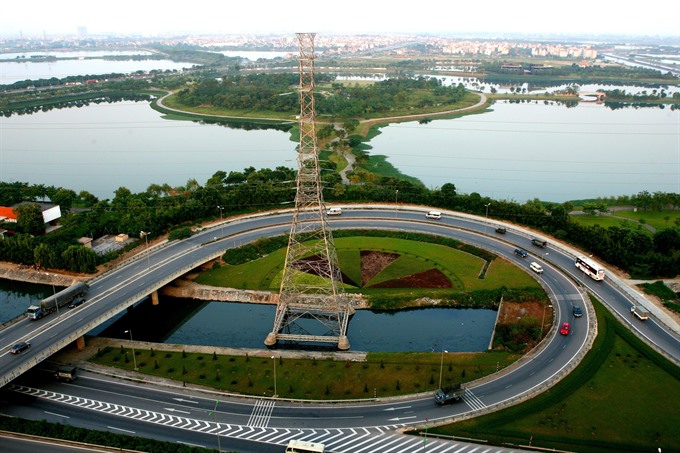 Politics & Law
Politics & Law

The 12th National Assembly on Wednesday approved a resolution for the State budget allocation for 2019, with total budget collection to exceed VNĐ1.411 quadrillion (US$61.34 billion) and total spending to hit more than VNĐ1.019 quadrillion.
 |
| A view of the Pháp Vân-Cầu Giẽ Expressway in Hà Nội. National Assembly deputies on Wednesday agreed that detail funding allocation should be made for programmes in green growth, climate change adaptation, serious environment pollution cases and new rural area model. — VNA/VNS Photo Huy Hùng |
HÀ NỘI — The 12th National Assembly on Wednesday approved a resolution for the State budget allocation for 2019, with total budget collection to exceed VNĐ1.411 quadrillion (US$61.34 billion) and total spending to hit more than VNĐ1.019 quadrillion.
The NA asked the Government to allocate funding effectively and have plans to cut or reduce funding for tardy projects along with supplementing funding for efficient projects.
Funds should be allocated to programmes in green growth, climate change adaptation, serious environmental pollution cases and new rural area models.
The resolution also stated how much of the central budget is allocated to each field, ministry, central agency, and national target programme. It also regulated the permitted overspending level of local budgets, the level of borrowing to make up for overspending, and the level of borrowing to pay off original debts of each locality.
The NA also asked ministries, central bodies and localities to allocate funds to pay outstanding loans in infrastructure construction while also recollecting reciprocal capital from the State budget for 2016-20.
Petitions and denunciations
Earlier the same day, Government Inspector General Lê Minh Khái told the National Assembly that heads of administrative agencies in some localities had failed to obey regulations on receiving citizens and handling petitions and denunciations.
“Some officials still lack responsibility and determination in supporting citizens in tackling petitions and claims, especially in sophisticated cases,” Khái said.
Deputy Vũ Trọng Kim from Hải Dương Province said authorities in localities should use strong measures to tackle this problem.
“It’s essential and important to properly respond to people’s claims, whether such claims are rational or irrational. It’s not right at all to transfer the claims around and at the end of the day they are still unsolved,” Kim said.
He also noted that it was regulated that the head of a province had to meet with voters at least once a month, while the head of a commune once a week.
“If any official fails to do so, he or she should resign. Leaders should not just go around visiting this place and that place,” he said.
Deputy Tô Văn Tám from Kon Tum Province mentioned the importance of talking with citizens.
“Dialogue should be considered the principle for dealing with petitions and claims, officials should respect that principle and conduct the process in a serious and constructive manner,” Tám said.
According to the Government’s report on the settlement of complaints and petitions delivered by Khái, the number of petitions and denunciations in 2018 increased by 11.8 per cent compared to last year and the number of cases rose by 4.7 per cent.
The chief inspector said most petitions involving a large number of petitioners were related to land, noting some hostile forces used petition cases to incite people to join in mass gatherings or extremist acts, disturbing social order.
Explaining the causes of the situation, Khái pointed to shortcomings in State management and law enforcement work, particularly in land use planning and the reclamation, allocation and lease of land.
At the same time, some petitioners lack respect or knowledge of the law, so they make unreasonable demands or continue to petition despite receiving appropriate settlement.
According to the Government’s report, administrative agencies have settled 27,580 cases of denunciation and petition within their jurisdiction, or 83.7 per cent of total cases, ensuring the rights and interests of 1,800 collectives and individuals. The agencies transferred nine cases to police, and requested violations by 462 individuals be dealt with.
The Government Inspectorate and inspection agencies of ministries, sectors and localities conducted more than 1,300 inspections this year, and detected violations in 533 units.
An evaluation of the Government’s report made by the NA Committee for Legal Affairs confirmed the statistics and assessments, but added the report did not break down the numbers of petitions in each sector such as social insurance, tax, customs and civil verdict enforcement. The report also failed to analyse the settlement of prolonged and complicated petitions as well as the development of cases involving large numbers of people.
The NA committee also noted the emergence of complicated petitions in economic and civil fields such as the collection of tolls at roads and disputes between residents and investors in high-rise housing projects and between banks and customers.
The NA committee said the report needed to analyse the increase of petitions and the quality and effectiveness of citizen reception work more deeply.
It pointed to the fact that some top officials still delegate the responsibility of receiving citizens to their deputies, and fail to combine citizen reception with the settlement of petitions, which made citizens not trust the settlement offered by authorised agencies and then appeal to agencies at higher levels. — VNS




